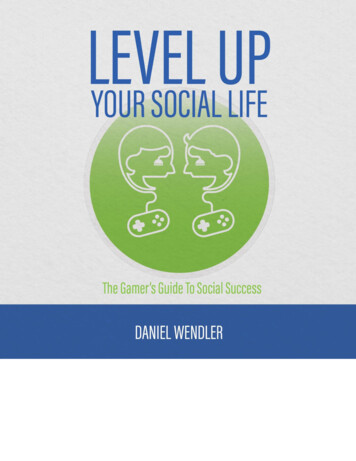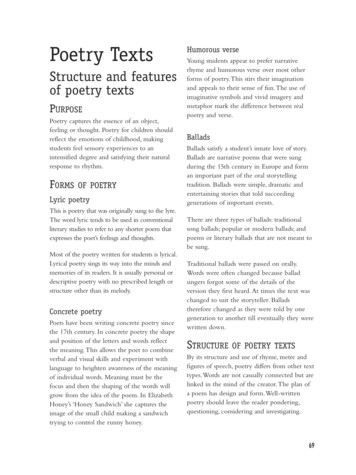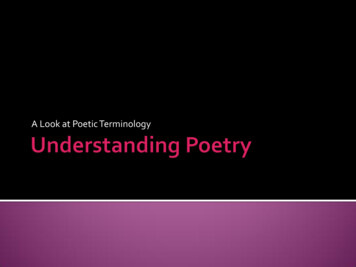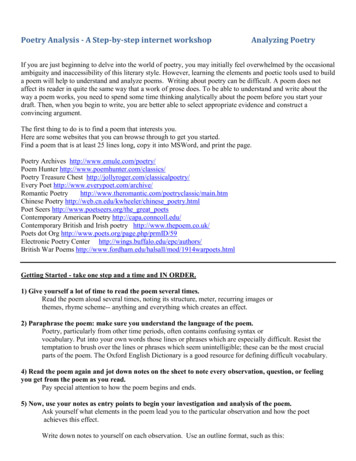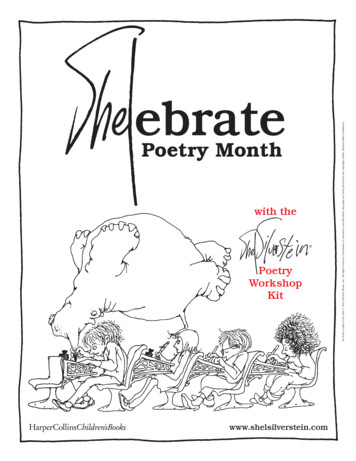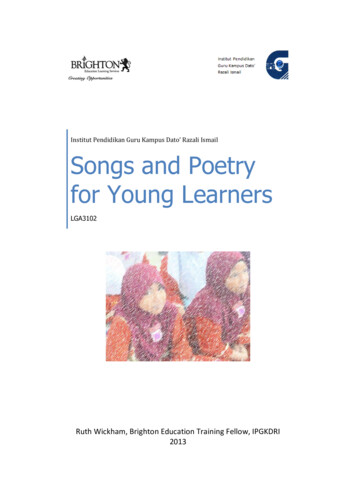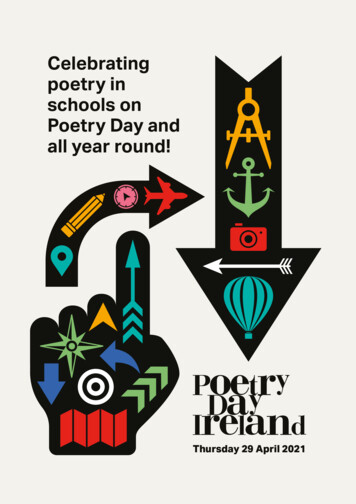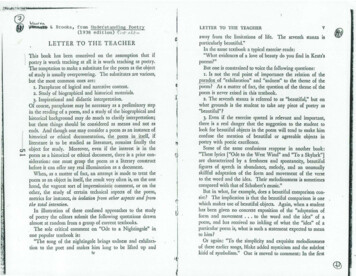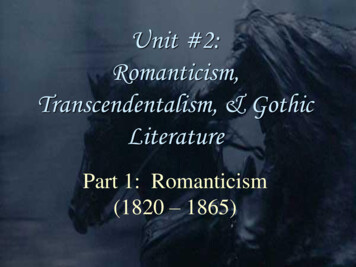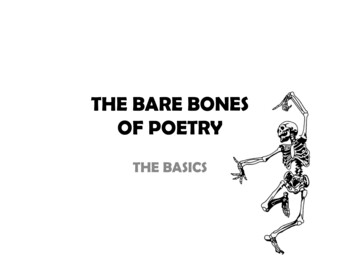
Transcription
Poetry QuestsKey Stage 3 English with Media Education
Holding a poem up to the light Pressing an ear against its hive .ContentsIntroduction1Using this Booklet51Empathising through Poetry82Poetry for Inspiration and Comfort103Using Language for Effect124Writing Poetry by Example155The Study of a Given Form186Exploring Imagery Using Visual Art197The Sound of Sense from Poem to Performance238The Class Anthology26Bibliography43Resources441
AcknowledgementsShauna McLaughlin (CCEA) would like to thank Maureen Boyle and Glynis McCune.
Poetry QuestsIntroductionPoetry Quests is a set of units of work on poetry whichare suitable for teaching in Key Stage 3 English withMedia Education. Teachers can dip in and out of the units,using and adapting the Suggested Learning and TeachingActivities in ways which will suit their own pupils.(For further guidance, see the Key Stage 3 CurriculumSupport and Implementation Box and the Key Stage 3 NonStatutory Guidance for English with Media Education booklet.)AimsThe overall aims of these units of work are to engage pupils in reading andappreciating poetry for pleasure, in and out of the classroom, and to enhancetheir understanding of a poet’s craft.The units also fulfil the statutory requirements for English with MediaEducation, allowing opportunities for pupils to: express meaning, feelings and viewpoints; talk, to include debate, presentations and group discussions; listen actively and report back; read for key ideas, enjoyment, engagement and empathy; write and present in different media and for different audiences andpurposes; participate in a range of drama activities; develop an understanding of different forms, genres and methods ofcommunication and an understanding of how meaning is created; develop their knowledge of how language works and their accuracy inusing the conventions of language including spelling, punctuation andgrammar; analyse critically their own and other texts; and use a range of techniques, forms and media to convey informationcreatively and appropriately.1
Poetry QuestsContexts for LearningEnglish with Media Education provides important contexts for thedevelopment of the Northern Ireland Curriculum skills and capabilities.Cross-Curricular SkillsCommunication is central to the whole curriculum. Pupils should be ableto communicate in order to express themselves socially, emotionally andphysically, to develop as individuals, engage with others and contribute asmembers of society.Across the curriculum, at a level appropriate to their ability,pupils should be enabled to develop skills in:Talking and ListeningPupils should be enabled to: listen to and take part in discussions, explanations, role-plays andpresentations; contribute comments, ask questions and respond to others’ points of view; communicate information, ideas, opinions, feelings and imaginings, usingan expanding vocabulary; structure their talk and speak clearly so that ideas can be understood byothers; adapt ways of speaking to audience and situation; and use non-verbal methods to express ideas and engage with the listener.ReadingPupils should be enabled to: read a range of texts* for information, ideas and enjoyment; use a range of strategies to read with increasing independence; find, select and use information from a range of sources; understand and explore ideas, events and features in texts*; and use evidence from texts* to explain opinions.WritingPupils should be enabled to: talk about, plan and edit work; communicate information, meaning, feelings, imaginings and ideas ina clear and organised way; develop, express and present ideas in a variety of forms and formats,using traditional and digital resources, for different audiences andpurposes; and write with increasing accuracy and proficiency.* Texts refer to ideas that are organised to communicate and present amessage in written, spoken, visual and symbolic forms.The activities in these units also provide opportunities for pupils todevelop and demonstrate the Cross-Curricular Skill of Using ICT.2These units provide a widerange of opportunities forpupils to acquire, developand demonstrate theCross-Curricular Skillof Communication. Theyalso include a variety ofopportunities for teachers toassess pupils’ performancein Communication.
Poetry QuestsThinking Skills and Personal CapabilitiesPoetry Quests provides relevant contexts for the development of pupils’Thinking Skills and Personal Capabilities. (For more information, see English– Thinking Skills and Personal Capabilities Progression Maps at Key Stage 3.)Across the Key Stage, these units give pupils opportunities to progress towards:Being Creative regularly challenging conventions and assumptions;experimenting and building on different modes of thinking;making new connections between ideas and information;following intuition and taking risks for success and originality; andvaluing the unexpected or surprising;Managing Information selecting, combining and synthesising information to meet the needs ofthe situation; and communicating confidently with a range of audiences and purposes and ina range of situations;Thinking, Problem-Solving and Decision-Making analysing a range of viewpoints; and applying understanding and making connections across the curriculum;Self-Management seeking out and acting on guidance and feedback;identifying and prioritising their own learning needs;prioritising the most important things to do;using time effectively and persisting with tasks in the face of frustrations; andbeing prepared to comment on the originality and value of work;Working with Others taking increasing responsibility for work assigned in teams; being willing to critically evaluate and change the approach in a groupif necessary; being willing to take the lead in demonstrating learning to others; being able to give and respond to feedback from peers and adults andunderstanding its importance for learning; and being willing and able to reach agreement through compromise.Many of the activities in these units incorporate various Thinking Skills andPersonal Capabilities.3
Poetry QuestsAssessment for LearningAssessment for Learning focuses on the learning process: not to provelearning, but to improve it. These units incorporate many examples ofAssessment for Learning, enabling you to integrate it into your classroompractice.Teachers have opportunities to: share learning outcomes, explaining what pupils will be learning and why; share and negotiate success criteria; develop pupils’ reflection on learning through use of peer - andself-assessment; give feedback to pupils that shows them how to improve through specificprompts or strategies; and practise effective questioning, eliciting good quality feedback from pupils.Pupils have opportunities to: take part in peer assessment, giving and receiving constructive feedback; take greater responsibility for their learning and for aspects ofassessment; and reflect on their learning, showing awareness of their strengths and areasfor improvement.Links to Key Stage 4The framework at Key Stage 3 is flexible. It allows teachers to establishfoundations for Key Stage 4 study by providing opportunities for pupils todemonstrate a deeper understanding. It also enables them to become moreindependent learners who will be more adept and experienced in managingtheir own learning.We have designed the suggested learning and teaching activities in theseunits to provide a good foundation for a range of subjects and qualifications atKey Stage 4. These include: English; English Language; English Literature; Key Skills Communication; and Drama.4
Poetry QuestsUsing this BookletThe aim of this booklet’s activities is to instil in young people a love of poetrywhich they can turn to for inspiration or comfort throughout their lives.Some teachers are worried and frightened by poetry, which can producepupils who are worried and frightened by poetry. Further reading can helpyou to feel at ease with it, but you should read poetry outside the curriculumrather than books that will ‘explain’ it to you. No book can truly explain poetryto you and this can be a limiting way both to read and to teach. If you trustyour own reading and allow pupils to make their own meanings everyonecan come to love the form. This approach is a natural prerequisite to goodlearning and teaching. While there is some suggested reading to build yourconfidence listed at the end of the booklet, simply reading poetry is the bestway to improve your own learning and teaching.Use the great freedom of the Northern Ireland Curriculum to teach poemsthat will interest your pupils and that they can find a way into. Try not tosimply use poems you know from GCSE or Key Stage 4 – these are oftenunsuitable. For example, Carol Ann Duffy’s poem ‘Valentine’ isn’t alwayssuitable below Year 10.Poems are about play – for the poet, who is playing with words and meanings,and for the reader. Unless the pupil is able to enjoy that play at some levelthey are not ‘getting’ poetry. Therefore it is often best to give up the idea of apoem as something that conveys single and simple meanings which you can‘translate’ for a class.A pupil’s first experiences of poetry should be fun. If they enjoy it pupils areless likely to view the study of the concepts and methods of poetry as ananxiety-making puzzle in which they feel they have no chance of ever catchingup with the teacher.Therefore, if they are going to teach poetry well, teachers should be preparedto say to a class: ‘I don’t know what this line means. Do any of you have anyidea?’ Meaning in poetry can be complex, so pupils need to feel comfortablein not being able to understand every single thing. They must realise that it isfine to work at the level of many possible interpretations. Pupils need to seetheir teacher work like this if they are to feel comfortable doing it too.It is important that pupils should have opportunities to write, as well as read,poetry right up to A Level. There are many opportunities to do this in theseunits of work.When marking a pupil’s essay on a poem, it is important that the teacher isopen to a new reading by the pupil and is not narrowly looking for only onepossible reading.It is important to remember that the poems proposed here are suggestionsonly. You can use any poems that suit the age range. Suitability is not easyto assess, but it is not always about staying with children’s poetry for theyounger pupils: it is about choosing something they can find a way to beexcited about and interested in, and they will often take their lead from you onthis. At Key Stage 3, William Carlos Williams’ idea of ‘No ideas but in things’5
Poetry Questsis a good starting point. Poems dealing with ‘things’ rather than abstractstend to work best with most Key Stage 3 pupils. The poems may point to ideasabout love, death, fear or joy but they will be grounded in objects or actualpeople.Most of the activities suggested here will focus on visual elements (imagery),and sound (rhyme and rhythm), since these take us back to the oral originof poetry and its most imaginative aspects. Sometimes these can be lost inmore traditional whole class readings.The objective of these units of work is to provide a methodology of teachingpoetry which: includes fun and speculation; encourages the pupils to bring their own experiences to the reading andunderstanding of a poem; helps them understand that there are always multiple interpretations; and allows them to feel confident in the reading they make without feeling theneed to resort to a ‘higher authority’.These units work from different levels of complexity and challenge.All introduce ideas about the indeterminacy of meaning and the possibilitiesand excitement of language. All the units provide the pupils with theopportunity to enjoy engaging with the text. This enjoyment should lead topupils developing good analytical and interpretative skills.Although you may be moving pupils towards comparative work on poemsto prepare for more advanced work at Key Stage 4, Key Stage 3 is a goodopportunity to take time over a single poem and make it, and a full reading ofit, the focus of assignments.Any Key Stage 3 year group can do the suggested activities but the choice ofpoem may change depending on age, ability or prior learning. Each activitybuilds on the previous one and the poems and the tasks become morechallenging as the units progress. Where there are two or more poems, theyare at increasing levels of sophistication and suitability for older and moreadvanced pupils depending on the exercise.Where you teach a mixed ability class, differentiation will be through theoutcome of the task because pupils will engage with the poem and the activityat different levels. As most of the tasks have a variety of outcomes all pupilsshould excel in some part of them.Finally, it is important to remember that not all poems that find their way intoa classroom need to be ‘worked’ on. There should be time and space in theclassroom for the pupils to enjoy poetry and to share and hear it for its ownsake.In the spirit of this resource and the idea that poetry can speak volumes, allof the above is summarised in Billy Collins’ wonderful poem,‘An Introduction to Poetry’.6
Poetry QuestsAn Introduction to PoetryBilly CollinsI ask them to take a poemAnd hold it up to the lightLike a colour slideOr press an ear against its hive.I say drop a mouse into a poemAnd watch him probe his way out,Or walk inside the poem’s roomAnd feel the walls for a light switch.I want them to water-skiAcross the surface of a poemWaving at the author’s name on the shore.But all they want to doIs tie the poem to a chair with a ropeAnd torture a confession out of it.They begin beating it with a hoseTo find out what it really means.Credit: Billy Collins, “Introduction to Poetry” fromThe Apple That Astonished Paris. Copyright 1988,1996 by Billy Collins. Reprinted with the permission ofThe Permissions Company, Inc., on behalf of theUniversity of Arkansas, www.uapress.com7
1Empathising through PoetryEmpathising through PoetryThe World is Dark When All MyFriends Go ColdCoral RumbleThe world is dark when all my friends go cold,And icy stares show no sign of a thaw,And even Ben believes the lies he’s told.The gossip is protected like it’s goldAnd each will add to it a little moreThe world is dark when all my friends go cold.The hurtful lies soon grow a hundredfold.I hear my name when passing by each door,And even Ben believes the lies he’s told.Now all the fragile memories I holdOf loyal friends are broken on the floor;The world is dark when all my friends grow cold.I realise my secrets have been sold,My heart is rubbed with sadness till it’s raw.And even Ben believes the lies he’s told.Mum says that I must learn to be more bold,Dad says life’s tough, I have to know the score;But the world is dark when all my friends grow cold,And even Ben believes the lies he’s told. From Breaking the Rules, Coral Rumble, Lion Children’s Books 20048
Empathising through Poetry1Empathising through PoetrySuggested Learning and Teaching ActivitiesThis is a useful poem to help pupils empathise witha character experiencing betrayal and loneliness.They can do this through discussing the narrative andfocusing on the vocabulary.The Walking DebateThe walking debate technique (See CCEA ActiveLearning and Teaching Methods for Key Stage 3) iseffective in helping pupils to actively consider andexpress personal views about aspects of friendshipexplored in the poem. You can use the statementsin Resource 1 to introduce the themes of the poembefore or after an initial reading of it.Friendship and LonelinessRead the poem aloud to the pupils and facilitate aclass discussion about the theme and whether pupilsrecognise any of the emotions or events from theirown experience.Brainstorm or mind map vocabulary relating tofriendship on the board. This can help pupils toarticulate the essence of friendship by generatingkey words. This is a good way to initiate discussion ofabstract nouns which will form part of the discussionat a later stage.The following activity helps pupils understand howthe relationship between the speaker and Ben hasdeveloped and been nurtured over time by allowingthem to create a shared history between the two. Ask pupils to get into pairs or groups. Give them aset of three random objects and ask them to comeup with a brief story outline around each whichillustrates the extent/strength/trial/value of thisfriendship. It may be helpful to ask specifically for: the age of the characters at the time; the setting; the event(s); and what the story shows about friendship.(Examples of stimulus objects could include a ticket,a sweet wrapper, a tree branch, a photograph or aschool detention letter.) Encourage pupils to reference abstract nouns andother key words from the brainstorm/mind map. Ask each group to feed back their ideas, giving adescription of their stories.Next ask the pupils to brainstorm or mind mapvocabulary relating to betrayal or loneliness on theboard. Facilitate the discussion of abstract nouns, forexample ‘memories’ or ‘sadness’ which pupils canexplore further when looking at the poem.Ask pupils for (or provide them with) a list of theadjectives and nouns used in the poem which capturethe speaker’s experience. Use the key words from thetitle as a header and footer (as shown in Resource 2). Ask pupils in pairs to mix, match and add to wordsfrom the betrayal and loneliness vocabulary usingthe following format: adjective/noun; adjective/noun; and so on (See Resource 2 forexamples).This will help them to develop a description of thespeaker’s experiences. You can provide younger orless advanced pupils with suitable adjectives andnouns to join up. Encourage the pupils to come up with unlikelycombinations to help them consider the emotionsfrom different viewpoints.Different PerspectivesYou could use a ‘Conscience alley’ activity (See CCEAActive Learning and Teaching Methods for KeyStage 3) to help pupils consider the speaker’sexperiences from different perspectives. You can usethe role cards in Resource 3 to encourage pupils tothink about some different roles.You could also do a rerun of the initial ‘Walkingdebate’ using the same statements as before. Thismight help pupils to actively reconsider and expresspersonal views about aspects of friendship exploredin the poem, having read and understood it.9
2Poetry for Inspiration and ComfortPoetry for Inspiration and ComfortWhatif by Shel SilversteinThis poem can be found online using asearch engine or in A Light in the Attic byShel Silverstein; Particular Books;ISBN 1846143853.Teachers and pupils can also find fun poetryactivities at www.shelsilverstein.com10
Poetry for Inspiration and Comfort2Poetry for Inspiration and ComfortSuggested Learning and Teaching ActivitiesThis is a useful poem to study to help pupilsappreciate that everybody worries about things thatare likely/unlikely/matter/don’t matter. As part of thestudy of the poem pupils can also explore ways tothink more positively.What Might Happen?Read the poem aloud to the pupils. Follow this up byallowing them to have a quiet, more detailed readingthemselves. As a class, agree the age, gender and broadcircumstances of the speaker in the poem. Ask pupils in pairs to diamond rank the Whatifs(Resource 4), from the perspective of the agreedspeaker in order of: likelihood; and seriousness. Using the diamond rank for seriousness, ask thepairs to draw a horizontal dividing line on theirrank to illustrate those Whatifs that they thinkare worth worrying about (above the line) andthose Whatifs that are not worth worrying about(below the line). Facilitate a class discussion about the levels ofseriousness in the different things that happenin life. Talk about methods they could use whendeciding what kind of things are not worthworrying about.(Diamond rank activity guidance from CCEA ActiveLearning and Teaching Methods for Key Stage 3).Creating Your Own PoemThis activity gives pupils experience in makingdecisions and justifying their choices. Ask pupils in groups to read the identity cardsin Resource 5. These set out broad sets ofcircumstances for a diverse group of people.Match the new Whatif statements in Resource 6 tothese characters. Each statement can be matchedto more than one character and each charactercan have a range of Whatifs. Lead a class discussion about how much some ofthe concerns can vary depending on the contextand how people cope with worries. Discuss what the concerns assigned to thatcharacter might mean in their specific context.Add other concerns. Collate and display these forclass reference. Collate key words relating to the chosencharacter’s worries. Identify rhyming words.It will be helpful to pupils if you display a numberof single syllable key words for rhyming. Ask pupils to get into pairs and write a rhymingcouplet. They should model the couplet on thepoem. Each line should consist of a questionbeginning with ‘Whatif.’ Pupils might opt for/be assigned rhyming couplets which, for thecharacter, are likely/unlikely/far-fetched.For example, the couplet might be from theperspective of an elderly person:Whatif on Thursday I run out of coal?Whatif my grandson can’t get off the dole?Whatif a fairy appears from my shoe?Whatif a crocodile comes up the loo? Create a class poem using the rhyming coupletswhich the pupils have written.Hopes and DreamsTo finish this exercise, the following activity shouldhelp pupils to appreciate that worries are counteredby hopes. Encourage pupils to consider the premise of thepoem from the opposite perspective:‘Why shouldn’t.’Facilitate a class discussion about optimism,hopes and dreams. Encourage pupils to articulateideas which are far-fetched, ordinary, personal orunrealistic about the world around them. Model a/some rhyming couplet/s, using the pupils’ideas and tailoring the final words to ensure theyrhyme. An example might be:Whyshouldn’t holidays be to the stars?Whyshouldn’t I some day drive flashy cars?Whyshouldn’t Africa have enough food?Whyshouldn’t people just stop being rude? Finally, pupils can create their own ‘Why Shouldn’t’poem, either individually or in pairs, using some ofthe ideas they have come up with in class. As a class, agree on one of the characters givenpreviously as a focus for class writing.11
3Using Language for EffectUsing Language for EffectAlphabet Stew by Jack PrelutskyThe poem can be found onlineusing a search engine or inThe Oxford Book of Children’s Poetry;Oxford University Press; 0192762761 .Teachers and pupils can also find fun poetryactivities at www.jackprelutsky.com.12
Using Language for Effect3Using Language for EffectSuggested Learning and Teaching ActivitiesWords for EffectThis is a useful poem for helping pupils understandthat everyone has the power to shape language andhow it can sometimes be interesting to look at theordinary in unusual ways.Read the poem aloud to the pupils. They may like tohear it more than once. Discuss what the poet is trying to convey with theclass. Pupils should understand that languagecan be chosen by a poet for very specific purposesand that it can create many different effects on areader. Explain to the pupils that this is what they aregoing to do in this unit – deliberately chooseparticular language to create the effects theywant.Verbal TennisYou could begin by asking pupils in pairs to play‘Verbal tennis’ in which they play a word associationexercise (See CCEA Active Learning and TeachingMethods for Key Stage 3). This helps to make pupilsaware that all words have a number of associations.TabooYou can play ‘Taboo’ with the class to help pupils drawon a range of vocabulary. (See CCEA Active Learningand Teaching Methods for Key Stage 3).Where in the World is the To help pupils think about creating original ideasthrough arbitrary connections create a class poemcalled ‘Where in the world is the.’ Put the title on the board. Split the class into three groups: Ask one group to come up with abstract nouns. Ask another group to come up with adjectives. Ask the third group to come up with commonnouns.If you want to give each individual in a group theopportunity to feed back, ask for the same number ofwords as there are people in a group. Select one person from each group. Ask themto pick one of their group’s words to use on theboard. Each person should write their chosenword clearly on a page, large enough to be seenby the class. They should then put blu-tac on thetop corners of their page on both sides so that theycan stick it on the board face down, so that theclass can’t see what it is. Meanwhile, their groupshould score this chosen word off the list so as notto use it again. Ask the three people selected to stick their pageface down on the board in the following order:abstract noun/adjective/common noun. Betweenthe spaces for the abstract noun and the adjective,write the words ‘of the’. Repeat the above process until all words havebeen used. Turn over the words to reveal the poem’s arbitraryconnections, for example: ‘Where in the world isthe.’ ‘anger of the beautiful wheelbarrow/wealthof the dizzy cake’.Nonsense WordsPupils can use the following activity to improvetheir confidence in working with letter and soundcombinations. Read and explore some examples of nonsensepoems with pupils, for example Michael Rosen,Spike Milligan or Edward Lear. Give pupils some nonsense words and ask themto come up with a definition for each within thecontext of school. Examples could include: a fruzzlewhaf (an old teacher with a lack ofpatience); Droomp (PE outside when it’s raining); Popclink (holidays); Bazinsk (detention); or a Grushel (soft chair).Discuss with the class why they have chosen thesedefinitions; is it the sound of the words that create anassociation for example?Continued overleaf13
3Using Language for Effect Ask pupils to come up with some nonsense wordsto do with school. Ask for three words for each ofthe following school-related categories: Place People Events Sounds Feelings Allow pupils the opportunity to feed some oftheir words back to the class. Facilitate a classdiscussion about the sounds and meaning of thewords. Roald Dahl can give interesting examplesof nonsense words, especially in novels such asCharlie and the Chocolate Factory and The BFG.Nonsense VerseThe following activity can bring together pupils’experiences of making arbitrary connections and ofcreating nonsense words. Ask pupils, in pairs, to pick an everyday eventor object as their focus, for example ‘dinner’ or‘television’. Use this word as a stimulus for wordassociations. Pupils could write their words downin any order, or they could place this word at thecentre of a mind map and work outwards. If thepupils decide on a mind map, create a modelfor them before they begin. Encourage pupils toinclude less obvious and more imaginative ideasand vocabulary. Ask pupils to include at least three nonsensewords which they can give the meaning for ifasked. Ask pupils to use a number of their noted wordsby: selecting and placing side by side words whichdo not have obvious connections; including the nonsense words; developing lines in which the word order isdeliberately unusual; and avoiding obvious or literal meaning.Pupils can use small words to bridge key words wherenecessary. Resource 7 shows examples of how thiscan be done. Finally, pupils could use the words and phrasesthey have been creating to write a nonsense poemabout school or an event or day in school. Theycould do this individually or in pairs.14
Writing Poetry by Example4Writing Poetry by ExampleYou’re by Sylvia PlathThis poem is available to view inthe printed version of this book.Please contact theCCEA Distribution Teamfor a copyTel: 028 9026 124215
4Writing Poetry by ExampleWriting Poetry by ExampleGeneticsSinead MorrisseyMy father’s in my fingers, but my mother’s in my palms.I lift them up and look at them with pleasure I know my parents made me by my hands.They may have been repelled to separate lands,in separate hemispheres, may sleep with other lovers,but in me they touch where fingers link to palms.With nothing left of their togetherness but friendswho quarry for their image by a river,at least I know their marriage by my hands.I shape a chapel where a steeple stands.And when I turn it over,my father’s by my fingers, my mother’s by my palmsdemure before a priest reciting psalms.My body is their marriage register.I re-enact their wedding with my hands.So take me with you, take up the skin’s demandsfor mirroring in bodies of the future.I’ll bequeath my fingers, if you bequeath your palms.We know our parents make us by our hands. Genetics from The State of the Prisons by Sinead Morrissey, edited by Michael Schmidt,published by Carcanet Press Limited, 2005. ISBN 978-185754775716
Writing Poetry by Example4Writing Poetry by ExampleSuggested Learning and Teaching ActivitiesThis is a good exercise to introduce the pupils to thevarious aspects of form without making it the entirefocus. Use a poem which repeats its structure. Askthe pupils to write their own poem using the sametitle and matching the structure as much as possible,for example: form; line length; rhythm; placing of metaphor; punctuation; rhyme scheme; and length.Many pupils like this very prescriptive structure for avariety of reasons. Pupils who might find the writingof poetry baffling have a structure to hang their ownideas on. They can find it liberating to be able to enjoythinking of the content without having to think aboutstructure. They are learning so much about howpoems are shaped in the process. Any one of thesepoems works for this kind of creative work. Below area few examples of how this might work.Mimicking Poet’s Use of Fo
Poetry Quests 1 Poetry Quests is a set of units of work on poetry which are suitable for teaching in Key Stage 3 English with Media Education. Teachers can dip in and out of the units, using and adapting the Suggested Learning and Teaching Activities in ways which will suit their own pupils. (For further guidance, see the Key Stage 3 Curriculum
